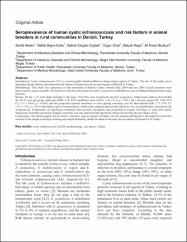Seroprevalence of human cystic echinococcosis and risk factors in animal breeders in rural communities in Denizli, Turkey

Göster/
Tarih
2014Yazar
Akalın, ŞerifeKutlu, Selda Sayın
Çaylak, Selmin Dirgen
Önal, Özgür
Kaya, Selçuk
Bozkurt, Ali İhsan
Üst veri
Tüm öğe kaydını gösterÖzet
Introduction: Cystic echinococcosis (CE) is a serious public health problem in sheep-raising regions of Turkey. The aim of this study was to determine the prevalence and associated risk factors of echinococcosis in rural regions of Denizli in Turkey. Methodology: This study was undertaken in four townships in Denizli County between May 2009 and July 2009. Family members were interviewed to assess possible risk factors for infection and tested for anti-E. granulosus antibodies by enzyme-linked immunosorbent assay (ELISA). Results: Of the 1,133 individuals included in the study, 78 (6.9%) were found to be anti-EG seropositive. Multivariate analysis showed that the 30-39 year age group (odds ratio [OR]: 3.29; 95% confidence interval [CI]: 1.30 +/- 8.33; p = 0.01), the >= 60 year group (OR: 4.08; 95% CI: 1.57 +/- 10.61; p = 0.004), and the group that reported sometimes or never getting veterinary care for their animals (OR: 1.75; 95% CI: 1.05 +/- 2.93; p = 0.032) had higher rates of seropositivity. Multivariate analysis showed that education was not significantly associated with seropositivity. Furthermore, no significant correlation with location, occupation, dog ownership or contact with dogs, or with cattle and/or sheep/goat ownership was found. Regular veterinary care and education had significant effects on lowering the prevalence of CE. Conclusions: Our results suggest that preventive measures, such as regular veterinary care for animals and educative and supportive activities oriented to the people working in farming and animal husbandry should be taken to decrease the prevalence of human CE in Turkey.

















